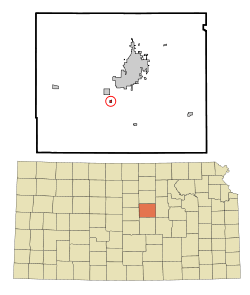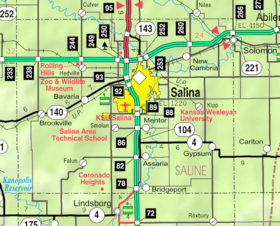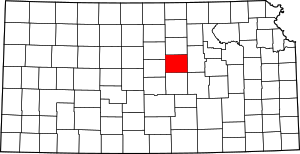Smolan, Kansas
Smolan is a city in Saline County, Kansas, United States. As of the 2010 census, the city population was 215.[6]
Smolan, Kansas | |
|---|---|
 Location within Saline County and Kansas | |
 KDOT map of Saline County (legend) | |
| Coordinates: 38°44′17″N 97°41′2″W | |
| Country | United States |
| State | Kansas |
| County | Saline |
| Incorporated | 1962 |
| Named for | Småland |
| Area | |
| • Total | 0.11 sq mi (0.29 km2) |
| • Land | 0.11 sq mi (0.29 km2) |
| • Water | 0.00 sq mi (0.00 km2) |
| Elevation | 1,283 ft (391 m) |
| Population | |
| • Total | 215 |
| • Estimate (2019)[3] | 204 |
| • Density | 1,837.84/sq mi (711.59/km2) |
| Time zone | UTC-6 (CST) |
| • Summer (DST) | UTC-5 (CDT) |
| ZIP code | 67479 |
| Area code | 785 |
| FIPS code | 20-66100 [4] |
| GNIS ID | 0476947 [5] |
History
Smolan was named after the Swedish province of Småland, the native home of a large share of the early settlers.[7]
A post office was opened in Smolan in 1887, and remained in operation until it was discontinued in 1997.[8]
Geography
Smolan is located at 38°44′17″N 97°41′2″W (38.738009, -97.683940).[9] According to the United States Census Bureau, the city has a total area of 0.13 square miles (0.34 km2), all of it land.[10]
Demographics
| Historical population | |||
|---|---|---|---|
| Census | Pop. | %± | |
| 1970 | 175 | — | |
| 1980 | 169 | −3.4% | |
| 1990 | 195 | 15.4% | |
| 2000 | 218 | 11.8% | |
| 2010 | 215 | −1.4% | |
| Est. 2019 | 204 | [3] | −5.1% |
| U.S. Decennial Census | |||
It is part of the Salina Micropolitan Statistical Area.[11]
2010 census
As of the census[2] of 2010, there were 215 people, 80 households, and 59 families residing in the city. The population density was 1,653.8 inhabitants per square mile (638.5/km2). There were 94 housing units at an average density of 723.1 per square mile (279.2/km2). The racial makeup of the city was 91.2% White, 3.7% Asian, 2.8% from other races, and 2.3% from two or more races. Hispanic or Latino of any race were 4.7% of the population.
There were 80 households of which 36.3% had children under the age of 18 living with them, 62.5% were married couples living together, 6.3% had a female householder with no husband present, 5.0% had a male householder with no wife present, and 26.3% were non-families. 23.8% of all households were made up of individuals and 2.5% had someone living alone who was 65 years of age or older. The average household size was 2.69 and the average family size was 3.12.
The median age in the city was 39.8 years. 27.4% of residents were under the age of 18; 8.4% were between the ages of 18 and 24; 18.7% were from 25 to 44; 36.7% were from 45 to 64; and 8.8% were 65 years of age or older. The gender makeup of the city was 53.5% male and 46.5% female.
2000 census
As of the census[4] of 2000, there were 218 people, 79 households, and 63 families residing in the city. The population density was 1,575.5 people per square mile (601.2/km2). There were 83 housing units at an average density of 599.9 per square mile (228.9/km2). The racial makeup of the city was 97.71% White, 0.46% African American, 0.46% Native American, 1.38% from other races. Hispanic or Latino of any race were 5.50% of the population.
There were 79 households out of which 41.8% had children under the age of 18 living with them, 68.4% were married couples living together, 6.3% had a female householder with no husband present, and 19.0% were non-families. 16.5% of all households were made up of individuals and 2.5% had someone living alone who was 65 years of age or older. The average household size was 2.76 and the average family size was 3.06.
In the city, the population was spread out with 31.2% under the age of 18, 5.0% from 18 to 24, 32.1% from 25 to 44, 22.5% from 45 to 64, and 9.2% who were 65 years of age or older. The median age was 37 years. For every 100 females, there were 101.9 males. For every 100 females age 18 and over, there were 108.3 males.
The median income for a household in the city was $40,500, and the median income for a family was $43,750. Males had a median income of $26,750 versus $23,750 for females. The per capita income for the city was $16,149. About 10.3% of families and 10.0% of the population were below the poverty line, including 12.5% of those under the age of eighteen and none of those sixty five or over.
Education
The community is served by Smoky Valley USD 400 public school district. The Smoky Valley High School mascot is Smoky Valley Vikings.[12][13][14]
Smolan High School was closed through school unification. The Smolan High School mascot was Smolan Swedes.[15]
Notable people
- John W. Carlin, former governor of Kansas (January 1979 – January 1987)
See also
- List of Nike missile locations
References
- "2019 U.S. Gazetteer Files". United States Census Bureau. Retrieved July 24, 2020.
- "U.S. Census website". United States Census Bureau. Retrieved 2012-07-06.
- "Population and Housing Unit Estimates". United States Census Bureau. May 24, 2020. Retrieved May 27, 2020.
- "U.S. Census website". United States Census Bureau. Retrieved 2008-01-31.
- "US Board on Geographic Names". United States Geological Survey. 2007-10-25. Retrieved 2008-01-31.
- "2010 City Population and Housing Occupancy Status". U.S. Census Bureau. Retrieved March 6, 2011.
- Kansas Place-Names, John Rydjord, University of Oklahoma Press, 1972, ISBN 0-8061-0994-7
- "Kansas Post Offices, 1828-1961". Kansas Historical Society. Archived from the original on October 9, 2013. Retrieved 23 June 2014.CS1 maint: unfit url (link)
- "US Gazetteer files: 2010, 2000, and 1990". United States Census Bureau. 2011-02-12. Retrieved 2011-04-23.
- "US Gazetteer files 2010". United States Census Bureau. Archived from the original on 2012-01-25. Retrieved 2012-07-06.
- Nussle, Jim (2008-11-20). "Micropolitan Statistical Areas" (PDF). List 1-9. Office of Management and Budget, Executive Office of the President. p. 97. Retrieved 2010-04-02.
- USD 400
- Kansas School District Boundary Map Archived 2011-07-21 at the Wayback Machine
- Saline County School District Map Archived 2011-07-27 at the Wayback Machine
- "The good ole days", The Salina Journal, 1 December 1994, p.17.
Further reading
External links
| Wikimedia Commons has media related to Smolan, Kansas. |
- City
- Historical
- Hickory Tree Restaurant, in former 1926 Smolan High School
- Maps
- Smolan City Map, KDOT
